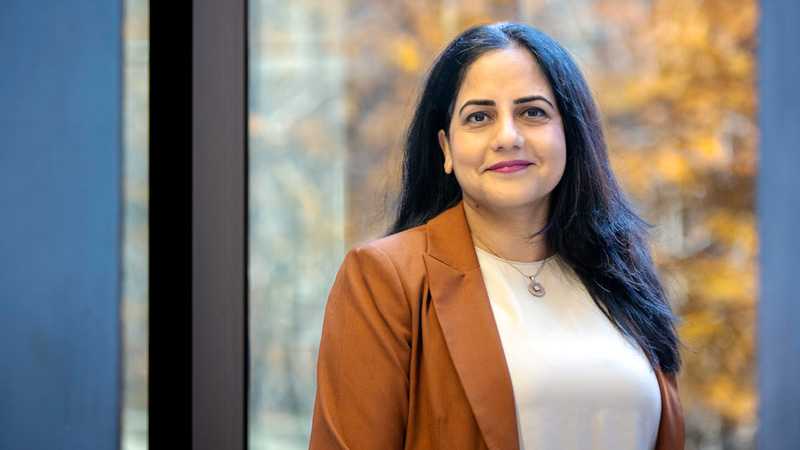Anjana Meel (EMBA ‘23) already had a PhD when she decided to apply to Rotman’s Executive MBA (EMBA). “Some people asked me why I was doing this program,” she says. “They didn’t think I needed it.”

Anjana Meel (EMBA ‘23)
Perhaps it looked that way because, in addition to her advanced degree, Meel had carved out a strong career. She had worked in senior-level roles as a chemical engineer for Dow Chemicals, as well as two clean-tech start-ups in the U.S., before heading north to Canada and joining the Ontario Public Service (OPS). There, she worked in three different ministries, developing market-based climate policies, tracking emission reduction targets for the province and developing the biochemical sector in Ontario. Most notably, she was the technical lead for the cleaner transportation fuels regulation at the Ontario Ministry of Environment, Conservation and Parks.
While Meel thrived in the sustainability sector within the OPS, during that time she began to work with stakeholders in the private sector climate change community, such as industry members within startups and large corporations. She began to understand that she could benefit from rounding out her current experience.
“I realized I wanted to work in leadership roles in sustainability, and be able to deliver solutions across a variety of sectors,” she says. “I knew if I could gain solid business skills, I would be in a good spot to do that.”
Meel explored several options before deciding on Rotman’s 13-month EMBA. She knew that she could keep working through the program - which is part-time. Beginning in the EMBA, Meel won the Women in Business Award, an entrance and early application award for women displaying qualities in leadership. Being in the top ten per cent of her class, she was also a Dean’s List and Bergman Scholar.
Meel was particularly interested in how the program prioritizes leadership development. The heart of the EMBA is Rotman’s integrated leadership framework, a comprehensive and multi-pronged approach to leadership development that includes one-on-one coaching, leadership assessment, a speaker series and a personalized career growth plan. For Meel, that framework worked. While she began the EMBA working as a public service employee, during the program she joined Guidehouse, a consultancy firm, as a management consultant in commercial sustainability. There, she helped clients across all sectors in their efforts to decarbonize.
“I wanted to work in leadership roles in sustainability, and be able to deliver solutions across a variety of sectors. I knew if I could gain solid business skills, I would be in a good spot to do that.”
–Anjana Meel (EMBA ‘23)
As a consultant, it’s important to find solutions for her clients that are customized – and that’s where Rotman came in, Meel says. “A very important part of consulting is that you are working with different teams on different projects, maybe people you’ve never worked with before. So, you have to be able to quickly connect to clients and team members and give them the right amount of space and direction. In class, we often discussed ways to build those relationships.”
She says the ‘Strategic Change Management’ course, rounded out her understanding of how to create change. “Professor Yongah Kim gave us the tools needed to implement a business transformation,” she explains, adding that Kim’s lessons included very specific models that have helped her since with effective decision making. “Since then, I’ve been applying these in my work in climate change.”
Rotman’s EMBA program promises students a powerful network of peers — more than half of graduates are CEOs, vice-presidents, directors, or managers when they first start the program.
Meel says the promise of this powerful network did not disappoint. “In my cohort of 65 people, everyone came with significant professional experience in their respective areas of expertise. Learning from those talented peers was amazing.” Meel gives the example of a group project she tackled in her ‘Sustainability Strategy’ class, where she worked on a team that had to assess the viability of a potential start-up. “We had a lawyer in the group who could analyze the IP of the technology, we had an investor, an accountant, an operations expert, and someone from the insurance industry,” she says. “We could pool ideas from so many different kinds of experts.”
Now, as Consulting Director for Corporate Sustainability and Climate Change at Environment Resources Management (ERM), Meel says she supports many vertical industries to address climate change, such as healthcare, energy, finance, and others. “Since completing the program, these talented people have become part of my network,” she says. “I can call them and ask for their input, and they can do the same.”
“And that’s pretty amazing.”
Written by Meaghan MacSween | More Student Stories »